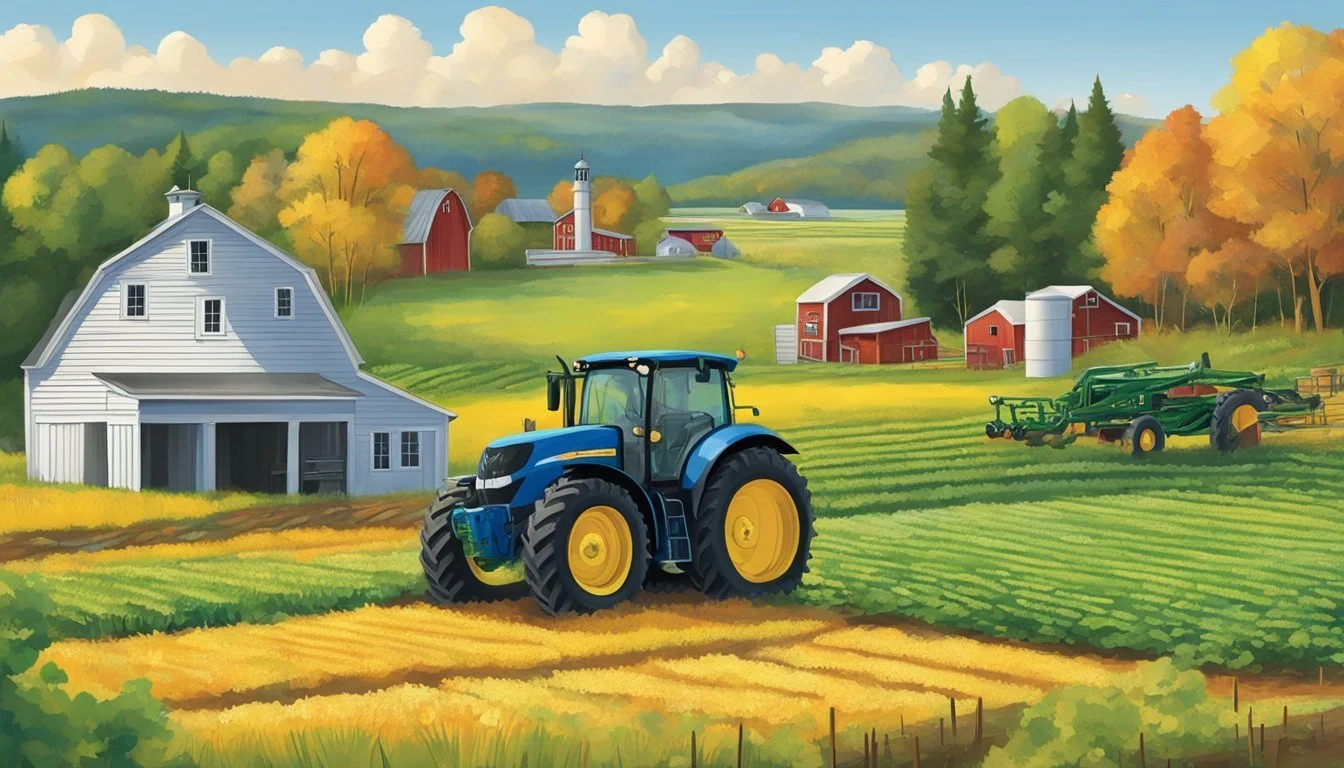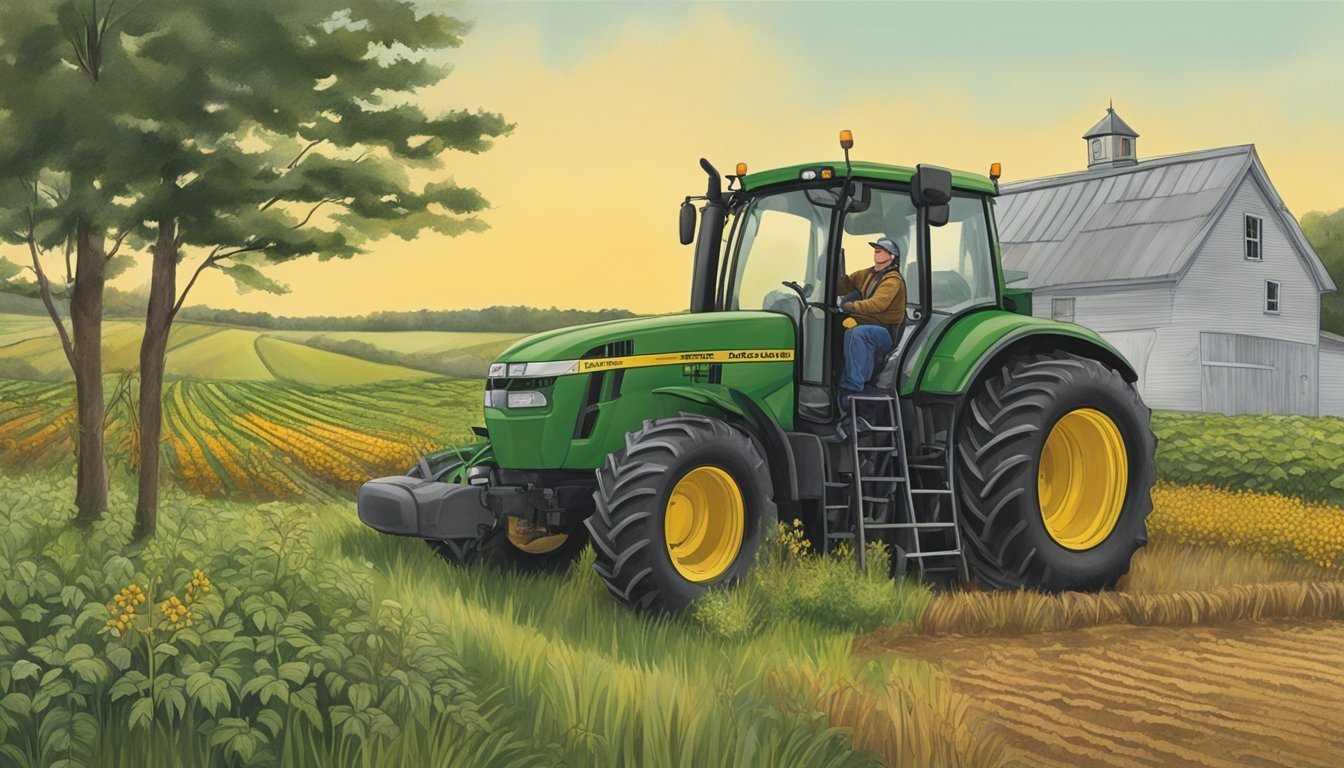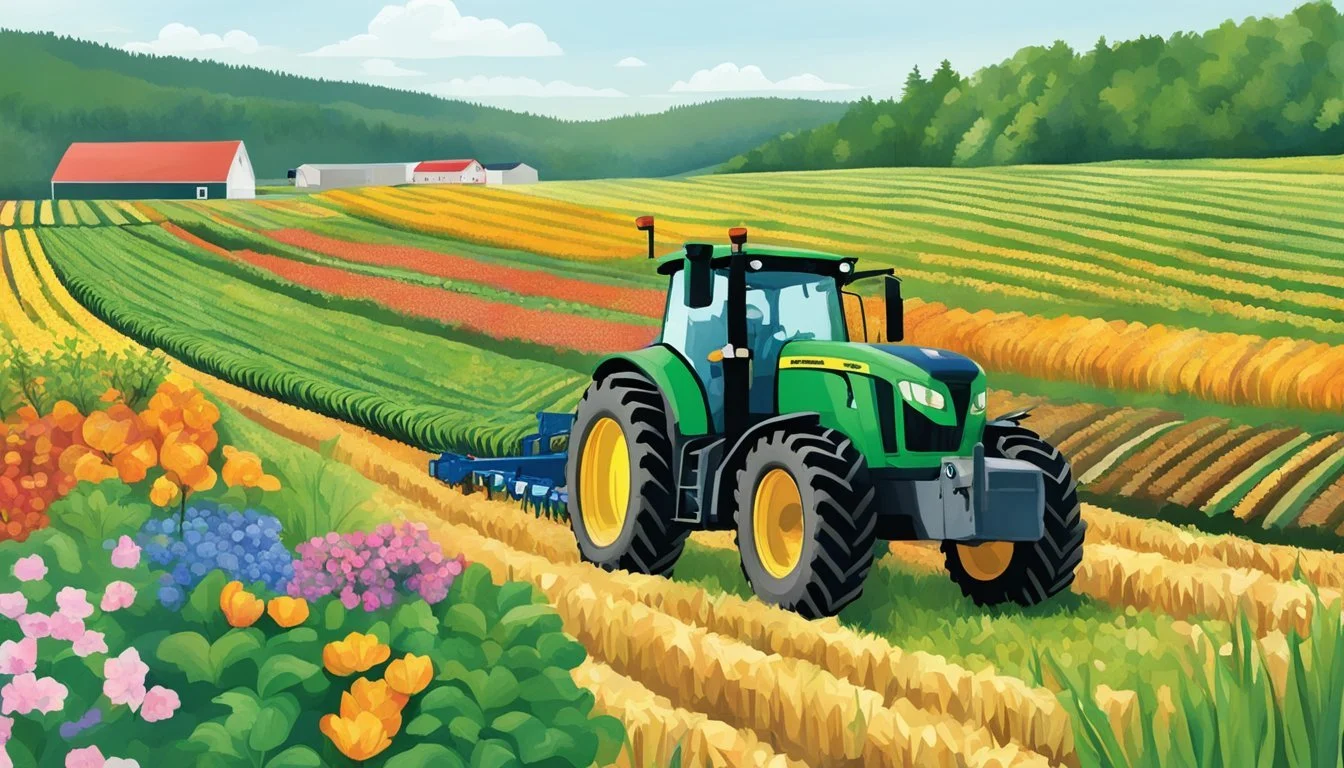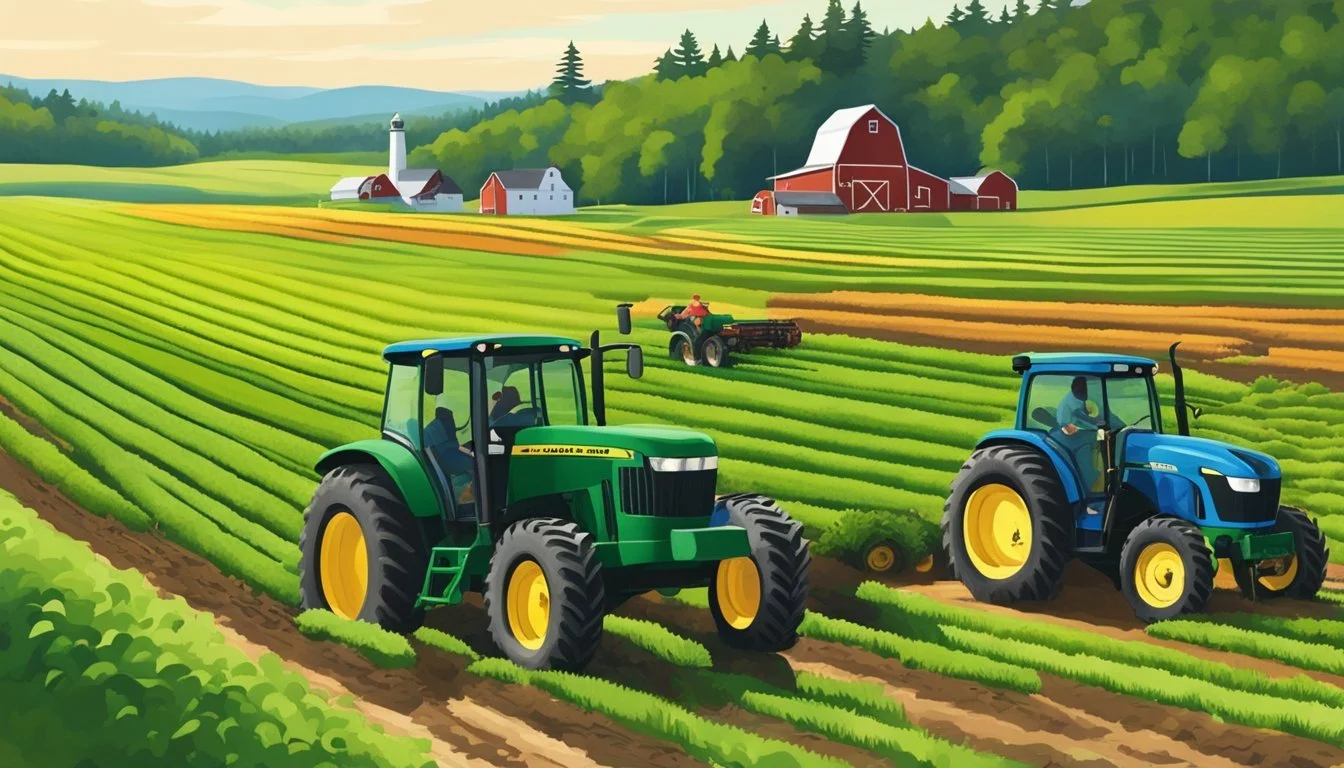Farming Grants Maine
Navigating Opportunities for Agricultural Funding
In the state of Maine, the agricultural sector is recognized as a fundamental component of the state's economy and cultural heritage. To support this vital industry, various grants and loan programs are available aimed at fostering the growth and sustainability of farms across the region. These initiatives are designed not only to protect farmland but also to ensure that farmers have access to the financial resources necessary to make capital improvements, adopt innovative practices, and maintain the competitiveness of their operations.
The Department of Agriculture, Conservation & Forestry is one such source that offers support to Maine's farmers. In addition to this state-level assistance, Maine Farmland Trust plays a crucial role in securing the future of farming. Their efforts focus on protecting agricultural land, supporting farmers, and promoting viable farming practices within local communities. Moreover, competitive federal funding, such as the USDA's Value-Added Producer Grants, has also been secured by some farms in Maine, exemplifying the availability and potential impact of such grants on the state's agriculture.
These funding opportunities reflect a collective commitment to bolster Maine's food supply, enhance economic growth within the farming sector, and affirm the state's reputation for exceptional food quality. By providing financial assistance through farming grants and loans, Maine reinforces its support for farmers, encouraging sustainable practices that benefit the entire state while also safeguarding its agrarian legacy.
Overview of Farming Grants in Maine
Maine offers a variety of farming grants designed to support agricultural businesses, enabling investment in growth and sustainability. These financial aids are available to Maine's agricultural sectors, assisting in everything from capital improvements to marketing of value-added products.
Types of Farming Grants Available
Grant Programs: The Maine Department of Agriculture, Conservation, and Forestry oversees grant programs that cater to different facets of farming. These grant programs are pivotal for agricultural development, offering necessary funds for specific projects.
Maine Farm Emergency Grants Program: This program assists farmers during times of unexpected crises, ensuring that unforeseen challenges do not cripple their operation.
USDA Specialty Crop Block Grant Program: Farmers can receive federal funding through this program, which has a focus on specialty crops, providing an avenue for agricultural diversification and innovation.
Rural Rehabilitation Trust Fund: This trust fund extends credit facilities to farmers for various agricultural purposes, thereby aiding in securing the rural agricultural infrastructure of Maine.
Investment and Funding: In addition to grants, initiatives like loans and cost-sharing options are available, making it easier to finance larger, long-term projects to enhance farm viability.
Agricultural Development Grant: Aimed at stimulating agricultural business, these grants support projects that promise to boost farming efficiency, product quality, and market reach.
Grant recipients usually demonstrate a clear plan for their agricultural enterprise, improving Maine's agriculture sector's competitiveness and ensuring that local communities benefit from a robust food system.
Eligibility and Application Process
To access farming grants in Maine, applicants must navigate a series of eligibility criteria and follow specific application procedures. A solid business plan is often required to illustrate effective grant use.
Determining Eligibility
Eligibility for agriculture-related grants in Maine is primarily dependent on the type of farming activity, the scale of operation, and the applicant's status. Farmers, rural businesses, and agricultural producers are often targeted groups. For instance, some grants give priority to entities like:
Beginning farmers or ranchers
Socially-disadvantaged farmers or ranchers
Small or medium-sized farms
Application Steps and Documentation Required
The application process is usually detailed and requires accurate documentation. Applicants should be ready to submit the following:
Proof of Farming Activity: Evidence such as ownership documents or lease agreements.
Financial Records: Balance sheets, income statements, and loan documentation.
Identification: Valid government-issued ID.
Project Proposal: A comprehensive outline of the intended use for the grant funds.
It's essential for applicants to carefully review grant-specific requirements and adhere strictly to submission deadlines.
Business Planning and Grant Usage
A well-defined business plan is essential not only for grant eligibility but also for the strategic use of funds. The plan should outline:
Goals and Objectives: Clear and achievable targets for the business.
Budget: An itemized forecast of how the grant money will be spent.
The usage of grants typically aligns with activities such as purchasing equipment, expanding marketing efforts, or engaging in value-added production. Proper planning ensures that the grant funds contribute to sustainable business growth.
Specific Grants and Programs
This section provides an overview of the various grants and programs available to farmers in Maine, ranging from federal USDA initiatives to state-funded opportunities and local community support.
USDA Grants and Programs
The United States Department of Agriculture (USDA) offers several grants and programs that aim at supporting the agricultural sector. Among these, the USDA Rural Development branch assists farmers in various ways, including market promotion, new technology demonstration projects, and agricultural infrastructure improvements. Notably, the Resilient Food Systems Infrastructure Program (RFSIP) plays a critical role in developing local food systems that are robust and sustainable.
State-Funded Grants
In Maine, state-funded grants like those facilitated by the Maine Department of Agriculture, Conservation and Forestry are substantial. Programs such as the Agricultural Infrastructure Investment Program (AIIP) provide financial assistance for long-term agricultural development. Additionally, the Dairy Improvement Fund (DIF), targeting dairy farmers, allows investments in new technologies and practices to enhance productivity and sustainability.
Local and Community Grants
Local organizations, including Coastal Enterprises, Inc. (CEI) and the Maine Farmland Trust, offer grants aimed at community development and farm preservation. CEI, with its focus on rural communities, often partners with agricultural businesses to foster growth. The Maine Organic Farmers and Gardeners Association (MOFGA), renowned for its support of organic farming, provides resources for farmers interested in sustainable practices and local food promotion. Community efforts are focused not only on financial support but also on ensuring the longevity and health of Maine's local food systems.
Agricultural Development in Maine
Maine's agricultural sector is seeing growth and revitalization through strategic investment in infrastructure, innovative research, and market development. These efforts are enhancing the state's farming capabilities and economic vitality.
Infrastructure and Capacity Building
Maine has prioritized enhancing its agricultural infrastructure and capacity to better support local producers. Strategic initiatives include developing greenhouse technologies and improving production systems. The Department of Agriculture, Conservation & Forestry, for instance, provides resources that bolster farming operations, impacting supply chain efficiency and expanding processing capacity.
Research and Technology Integration
Research plays a pivotal role in Maine's agricultural progress. The integration of advanced production technologies and practices is improving yields and sustainability. The focus extends to market research, empowering farmers to align with consumer demands. Partnerships with educational institutions and government programs are vital in driving innovation and developing new products.
Market Expansion and Promotion
Maine is committed to cultivating new opportunities for its agribusinesses. This involves the expansion of local and national markets through value-added processing and proactive marketing strategies. Government grants, like those from the USDA's Value-Added Producer Grant Program, fund initiatives that increase market presence and promote Maine's agricultural commodities. These grants also support local food production, ensuring the economic benefits stay within rural communities.
Support and Resources for Maine Farmers
Maine offers a robust network of support and resources aimed at promoting the success and sustainability of its agricultural enterprises. This section explores the technical assistance available to farmers as well as the financial mechanisms in place to support farm growth and innovation.
Technical Assistance and Education
Farmers in Maine have access to a wealth of technical assistance and educational programs to enhance their agricultural practices. The Maine Department of Agriculture, Conservation, and Forestry (DACF) is a key provider, offering guidance on best practices in farming and conservation. Additionally, educational resources are readily available through entities such as the Cooperative Extension, which extends expertise in farm management, crop production, and more.
Educational Programs
Farm Management Training
Crop Production and Sustainability Workshops
Conservation and Land Use Planning Sessions
Key Providers
DACF
Maine Cooperative Extension
Financial Resources and Loans
For financial support, the DACF administers loan programs and grants designed to improve farm operations. Maine Farms for the Future Program offers grants for the development and implementation of farm business plans. Moreover, farmers engaged in dairy production can approach the Bureau of Agriculture, Food and Rural Resources to apply for loans covering a substantial portion of project costs for capital improvements.
Loan Details
Program Offer Eligibility Maine Farms for the Future Grants Farms seeking business development Bureau of Agriculture Loans up to 90% project cost Dairy farms for capital improvements
Loans and grants are updated periodically, and farmers are advised to check the current status and application details with the respective department. The Maine Federation of Farmers’ Markets also provides guidance on finding funds for farming endeavors.
Impact of Farming Grants on Maine's Agricultural Sector
The introduction of farming grants in Maine has catalyzed a transformative change in the agricultural sector by injecting much-needed capital for development and innovation. These funds are primarily aimed at enhancing economic viability, bolstering community resilience, and promoting environmentally sustainable practices within the farming industry.
Economic Growth and Job Creation
The infusion of federal funds, approximately $20 million in 2022, into Maine's agriculture sector has directly led to the creation of economic opportunities and jobs. Grant programs like the Agricultural Infrastructure Investment Program (AIIP) have offered substantial support to local agriculture businesses. By providing grants of up to $500,000, these programs have enabled farms and food processors to make significant investments, thereby fostering an environment conducive to economic growth and employment expansion across the state.
Community Development and Food Security
Grants aimed at Maine's agricultural community have also significantly impacted community development and food security. Investments in critical infrastructure, as seen with the cited Agriculture Marketing Loan Fund and Dairy Improvement Fund, have improved the efficiency of food markets and local food production systems. This has not only supported farms in increasing their production capabilities but has also enhanced the access of local communities to fresh, locally-grown produce, thus reinforcing food security.
Sustainable Farming Practices
Moreover, these grants equip farmers with the resources needed to adopt sustainable farming practices. The viability of farms is maintained and enhanced through programs like the Land for Maine's Future, and access to loans that cover a significant portion of the costs for capital improvements. As a result, Maine's agriculture thrives on a model that respects ecological balances, prioritizes long-term sustainability, and encourages responsible stewardship of natural resources.
Challenges and Considerations
Farmers in Maine face several hurdles, from the long-term impacts of the pandemic to the complexities of the market. This section explores those challenges and how they influence the agricultural sector’s pursuit of grants and sustainable growth.
Navigating Pandemic-Related Disruptions
The COVID-19 pandemic significantly impacted Maine's agricultural industry, causing market disruptions, supply chain issues, and workforce challenges. The Agricultural Infrastructure Investment Program (AIIP) is an example of support aimed at alleviating these pressures. It represents a response to the need for critical funding to assist farms and food processors that continue to grapple with these pandemic-related difficulties.
Addressing Competitive Markets
Maine's agribusinesses operate in an increasingly competitive environment, where expansion and innovation are essential for survival. Grants, such as those received by Blue Barrens Farm for expanding wild blueberry production, underscore the crucial role of financial support in helping farmers enhance their production capacities and distribution networks to remain competitive.
Ensuring Equity and Fair Access
Ensuring that every farm and agribusiness has equitable access to financial resources like grants and loans is vital. The Sustainable Agriculture Fund by Coastal Enterprises, Inc. offers financing options with fixed rates starting at 5%, but it's imperative that these opportunities are distributed fairly, allowing a diverse range of operations to benefit regardless of their size or financial background.
Success Stories and Case Studies
The vibrant agricultural scene in Maine is characterized by a tapestry of farms and agribusinesses that have availed themselves of federal and state grants to propel growth and innovation.
Revitalized Farms and Businesses
Maine's farming landscape is dotted with success stories of agricultural output expansion and economic growth. Grants have played a crucial role in these achievements.
Copper Tail Farm and Balfour Farm stand as notable examples of agribusinesses that have utilized grant funds effectively. Both have harnessed these financial resources to enhance their farm operations, expand production capabilities, and subsequently increase their presence in the local market.
Innovative Agricultural Projects
Investing in innovation, Maine has seen an uptick in agribusinesses leveraging grants for novel agricultural projects.
Projects focused on wild blueberry production have been particularly successful, with an emphasis on utilizing new technology to boost yield and efficiency.
Farm store initiatives, which directly link producers with consumers, have been backed by grant monies, thereby fostering an environment where farm-to-table is not just a concept but a practical reality for Maine residents.
Fostering thriving farm businesses, these grants serve as catalysts for empowering Maine's agricultural producers to dream big and achieve tangible results.
Looking to the Future
Maine's agricultural sector is preparing for the future by focusing on market opportunities and long-term sustainability. These efforts are crucial in maintaining the vitality of Maine's farming communities.
Anticipating Market Trends
In agriculture, staying ahead means understanding and capitalizing on market trends. For Maine's farmers, this includes identifying crops that are on the rise due to consumer demands or global market shifts. It's essential to integrate these trends with the state's robust support, such as the Maine Farms for the Future Program. This program assists farmers in planning and implementing strategies to adapt to market changes effectively, ensuring they remain competitive and responsive to demand.
Planning for Long-Term Sustainability
Sustainability encompasses economic viability, environmental stewardship, and community health. Maine's farmers are encouraged to create comprehensive plans that address these facets. Initiatives by organizations like the Maine Farmland Trust aim to protect agricultural land and support farmers. They provide guidance on both conservation practices and business operations, ensuring that farms remain productive and sustainable for future generations. The state offers programs like the Agriculture, Conservation and Forestry grants, which fund projects that enhance the viability of dairy farms, promoting both ecological sustainability and economic growth.
By looking ahead and planning for these factors, Maine's agricultural sector positions itself to thrive for years to come.
Additional Information and Resources
When seeking information about farming grants in Maine, resources are plentiful. One should refer to the state departments for detailed guidance, consult with professionals for tailored advice, and subscribe for the latest updates to stay informed about new opportunities and changes.
Contacting State Departments
For inquiries regarding grants and loans, the Department of Agriculture, Conservation & Forestry is a primary contact point. They can be reached at:
Phone: (207) 287-3200
Fax: (207) 287-2400
TTY: Maine Relay 711
Email: [email protected]
Their office is located at 22 State House Station, 18 Elkins Lane, Augusta, ME 04333.
Professional Consultations
Engaging with experts in agricultural resource development can provide applicants with insight and assistance in the application process. They offer guidance on how to improve opportunities for grant success and can advise on optimizing resources available to Maine's farmers.
Staying Informed with Updates
To stay current with the latest information, one can subscribe to the GovDelivery subscriber page specifically tailored for the Department of Agriculture, Conservation & Forestry. This resource provides updates directly from the department, ensuring subscribers receive timely and accurate information about grants, policies, and agriculture news.
Conclusion
Maine's commitment to its agricultural sector is evident through the consistent financial support provided to farms and agribusinesses. Programs like the USDA's Value-Added Producer Grant Program have injected over $2 million into ten Maine agricultural producers, showcasing the success of such initiatives. Five additional farms benefited from more than $1 million in grants, indicating a trend of generous funding for the industry.
The Department of Agriculture, Conservation, and Forestry continues to stand as a central resource, with contact information readily available for those seeking assistance. With a base at 22 State House Station, 18 Elkins Lane, Augusta, and a contact number of (207) 287-3200, obtaining information about agricultural grants and loans is both accessible and efficient.
The investment in sustainable agricultural funding by entities like Coastal Enterprises, Inc. further diversifies the financial landscape for Maine farmers. Their tailored loans cater to varying needs, from microloans of $5,000 to substantial investments, at starting rates of 5%.
Future Outlook
The trajectory of funding for Maine's agriculture indicates a stable and supportive environment for growth and innovation. The collaboration of federal programs with state departments underlines a shared vision to bolster the agricultural backbone of Maine. As the state continues to focus on rural development, one can expect a consistent flow of support for the farmers and agricultural entrepreneurs who play a crucial role in the state's economy and community.









